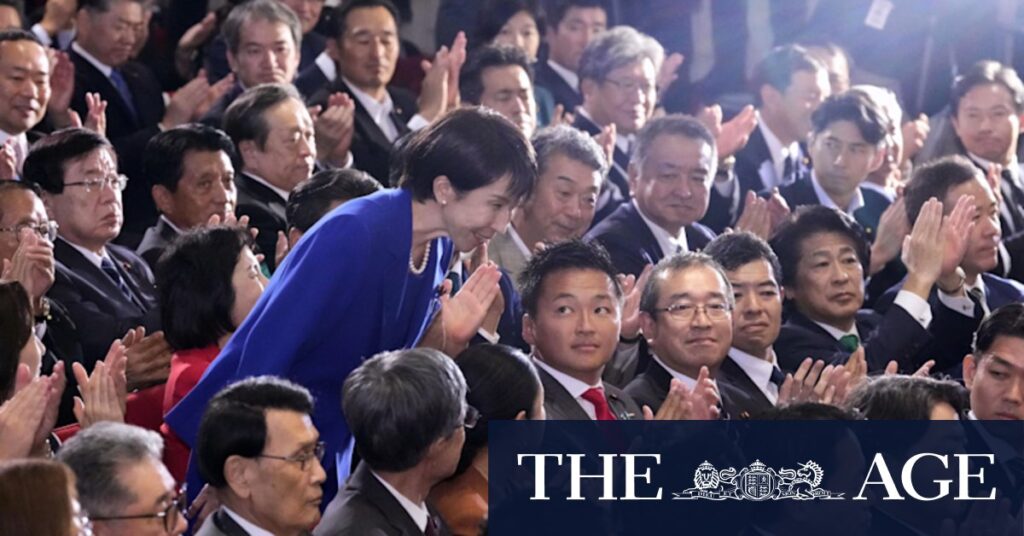
Singapore: Once a pink-haired, heavy metal rocker, Sanae Takaichi has transformed into one of Japan’s leading arch-conservative lawmakers. Inspired by Britain’s Margaret Thatcher, Takaichi is now poised to break new ground as she aims to become Japan’s first female prime minister, potentially shifting her party’s political agenda to the right.
“My goal is to become the ‘Iron Lady’,” Takaichi declared recently as she launched her third bid to lead Japan’s ruling Liberal Democratic Party (LDP). Her journey from a rebellious youth to a political powerhouse has been marked by a steadfast commitment to conservative values, earning her both admiration and criticism within her party.
Political Ascent and Leadership Challenge
The former economics security minister clinched a victory in the party leadership ballot on Saturday, overcoming the more centrist frontrunner, agriculture minister Shinjiro Koizumi. At 44, Koizumi was vying to be Japan’s youngest leader in over a century, but Takaichi’s win underscores the LDP’s current conservative tilt.
She is set to succeed Shigeru Ishiba, who resigned last month following historic election defeats that saw the LDP lose its majority in both houses of parliament. While Takaichi is expected to be confirmed as the next prime minister by the Diet, Japan’s national parliament, opposition parties could still pose a challenge, though they remain too fragmented to present a united front.
International and Domestic Challenges
Takaichi faces immediate challenges on the international stage, including managing the unpredictable dynamics with the Trump administration and a 15 percent U.S. tariff deal that obliges Japan to invest $550 billion in the American economy. However, it is the domestic hurdles that may prove more daunting.
Japan is grappling with a stagnant economy, rising prices, and increasing public anxiety over foreign workers and tourists. Takaichi’s election indicates a conservative resurgence within the LDP, aiming to regain public support after losing the upper house election in July to the far-right Sanseito party.
Conservative Vision and Public Skepticism
Despite her victory, analysts remain skeptical about Takaichi’s vision for party reform, particularly concerning campaign finance and the slush fund scandal that plagued the LDP in 2023. This scandal significantly eroded public trust, and many voters are wary of the status quo.
“For the public, it looks like business as usual and, for a lot of them, that’s no longer acceptable,” said Jeff Kingston, a political scientist at Tokyo’s Temple University. “A socio-economic malaise is gripping Japan and that has made a lot of voters sceptical of the ruling elite.”
While her election is a milestone for the LDP and Japan’s political system, where women make up about 15 percent of the lower house, doubts linger about her commitment to gender issues. Takaichi has opposed reforms like allowing married couples to have separate surnames and female succession in Japan’s imperial family.
A Complex Political Persona
Once a drummer in a metal band and motorcycle enthusiast, Takaichi entered the Diet in 1993, rising through the ranks as an ally of Shinzo Abe, Japan’s longest-serving prime minister, who was assassinated in 2022. She is a staunch supporter of Abe’s “Abenomics,” focusing on government stimulus and low-interest rates, and is known for her nationalistic views.
Her regular visits to the Yasukuni shrine, where 14 convicted war criminals are enshrined, have been a point of contention, particularly with China and South Korea. In her victory speech, Takaichi emphasized the need for hard work to rejuvenate the LDP, which has dominated Japan’s post-war political landscape.
“Everyone will be required to work — work like a horse. I will abandon the notion of work-life balance. Work, work, work, work, work,” she stated.
As Takaichi prepares to potentially take on the role of prime minister, her leadership will be closely watched both domestically and internationally. Her ability to navigate Japan’s complex political landscape and address pressing economic and social issues will determine her legacy as a trailblazer in Japanese politics.







